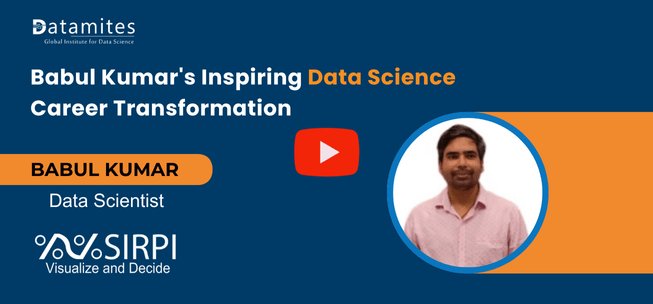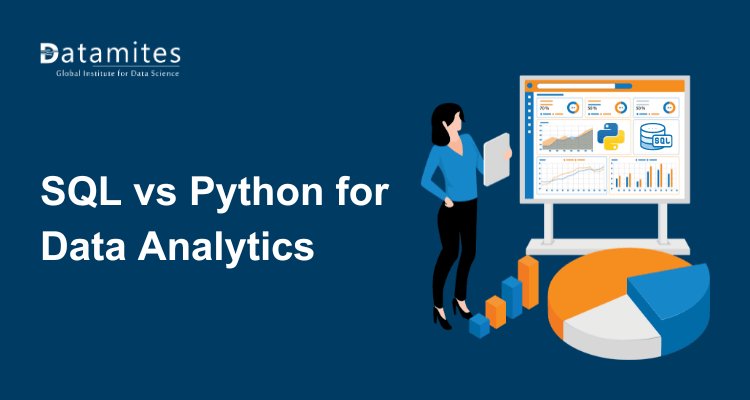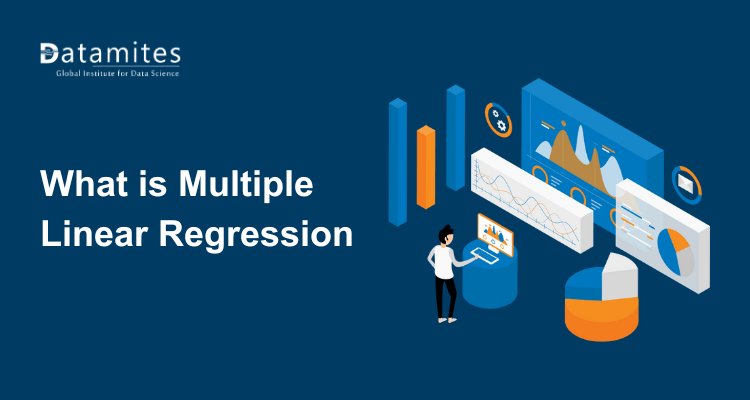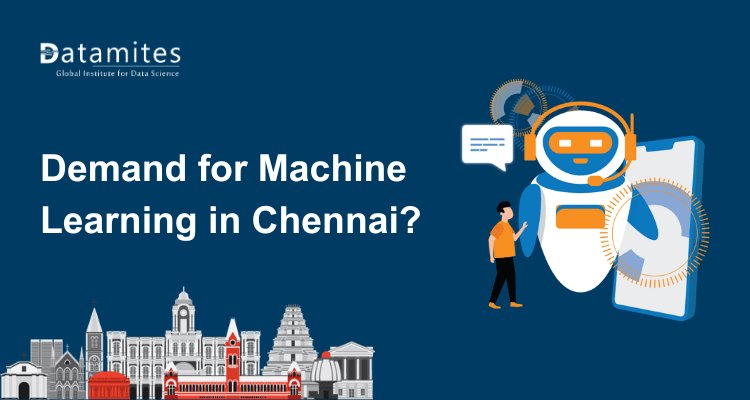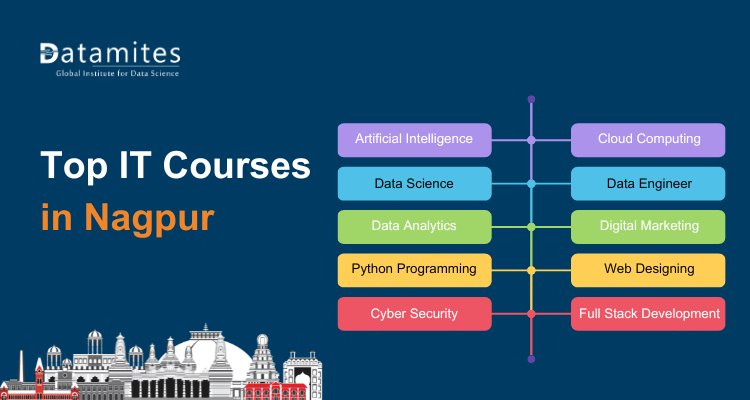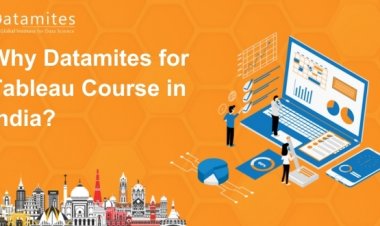From BPO to Data Scientist: Babul Kumar’s Inspirational Journey
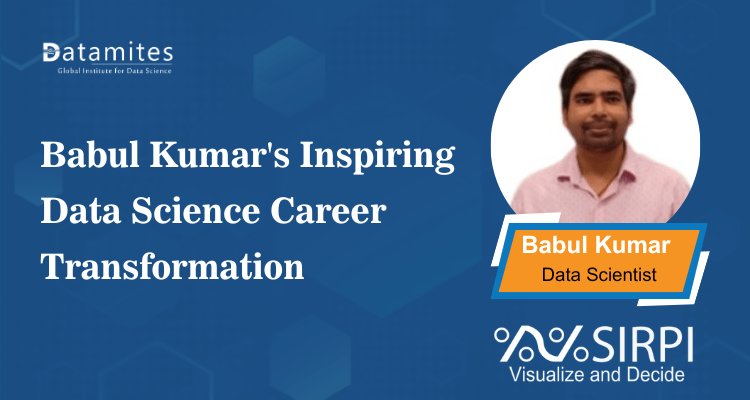
The world of data science is constantly evolving, attracting professionals from various backgrounds eager to transition into this promising field. One such individual is Babul Kumar Jha, whose journey serves as a true inspiration for aspiring data scientists. Babul successfully transitioned into data science with the guidance of DataMites, a leading data science training provider.
Babul Kumar’s transformation unfolds through his background, motivations, challenges, and the pivotal role DataMites played in his career shift.
Babul Kumar’s Inspiring Journey into Data Science with DataMites
Join us as we explore Babul Kumar’s transformative journey into the world of Data Science, guided by DataMites.
Q1: Can you introduce yourself and share your background before joining DataMites?
I completed my B.Tech from Bhopal in Electronics and Communication Engineering. I had some basic knowledge of C and C++ programming during my engineering studies, but I didn’t have a strong programming background. I was interested in transitioning into data science, and that’s when I joined DataMites institute to pursue their Certified Data Science Course.
Q2: What motivated you to switch to data science?
While working in my previous domain, I realized that data science is a booming field with huge opportunities. However, I was struggling to switch into this field due to a lack of structured learning and hands-on experience. That’s when I started looking for a reliable course, and DataMites provided me with the right training and guidance to make this transition successfully.
Q3: How long was your training at DataMites?
My training at DataMites lasted for six months, during which I learned various essential skills, including Python, NumPy, Pandas, Matplotlib, Seaborn, and Machine Learning algorithms.
Q4: What was your job before transitioning into data science?
I was working in a BPO (call center) sector, which was not relevant to data science. However, with the right training, I was able to switch careers successfully.
Q5: Did you attend live sessions, or were you an online learner?
I took the online course because I was already working in a BPO sector at that time. Since I couldn’t attend offline classes, I opted for weekend batches and used e-learning videos for self-study.
Q6: What challenges did you face while learning data science?
Initially, I had some concerns about whether I would succeed in this field. Since I was coming from a non-programming background, I had a mixed feeling of doubt and excitement. However, as I progressed through the course, I gained confidence. The biggest turning point was when I started working on real-world projects. That’s when I truly understood the concepts and felt prepared for a data science career.
Q7: How did DataMites’ training help you in job placement?
The training at DataMites was highly practical. The real-time client projects and capstone projects helped me develop hands-on experience. In fact, I got my first job offer while I was still working on my final project.
Q8: How many job interviews did you attend before securing your first job?
I attended two interviews before securing my first job. I was not selected in my first interview, but I learned from the experience and improved my preparation. In my second interview, I successfully got a job as a Data Scientist.
Q9: What kind of questions were asked in the interviews?
The interviewers focused mainly on my projects and practical knowledge. They wanted to ensure that I had hands-on experience with the concepts I had listed on my resume. They asked me detailed questions about my projects to assess whether I had a clear understanding of the methodologies I used.
Q10: How long did it take you to secure a job in data science?
I got my first job at Sirpi while I was still completing my final project at DataMites. After gaining real-time experience, I switched to DriveX as a Data Scientist with a ₹10 LPA package.
Q11: Can you share your professional background before stepping into data science?
Before venturing into data science, I was working in a different domain. I had always been intrigued by numbers, patterns, and analytics, but my job didn’t provide me with the opportunity to explore this passion.
I realized the growing significance of data-driven decision-making in industries and wanted to be a part of this transformative field. That’s when I decided to pursue a structured learning program to equip myself with the necessary skills.
Q12: What motivated you to choose DataMites for your data science training?
When I started researching data science courses, I came across multiple options. However, DataMites stood out for a few key reasons:
- Comprehensive Curriculum – DataMites covers essential data science concepts, including machine learning, deep learning, and AI, ensuring a well-rounded understanding.
- Hands-on Learning – The course emphasizes practical applications with real-world projects, which was crucial for someone like me with no prior experience.
- Industry-Recognized Certifications – DataMites offers globally recognized certifications, adding credibility to my resume.
- Mentorship and Career Support – The support system, mentorship, and placement assistance helped me gain confidence in my transition.
After attending an introductory session and going through their curriculum, I knew DataMites was the right choice for me.
Q13: How did the training at DataMites help you transition into a data science role?
DataMites provided structured training that gradually built my confidence in data science. The course covered a wide range of topics, including:
- Python for Data Science – Learning Python was crucial as it is the primary language for data science.
- Machine Learning and AI – Understanding algorithms and models helped me analyze and interpret complex data.
- Data Visualization – Tools like Power BI and Tableau allowed me to present data-driven insights effectively.
- Hands-on Projects – The real-world projects and case studies enabled me to apply my learning to practical scenarios.
Beyond the technical training, DataMites also provided soft skills training and career guidance, helping me prepare for job interviews and industry expectations.
Q14: Apart from DataMites materials, did you study anything else?
My approach focused on consistent daily practice. To master Python, Pandas, Matplotlib, Seaborn, or any machine learning concept, regular practice is essential. This helps in understanding how each function and attribute works, making it easier to apply in real-world projects. For beginners in data analytics, I highly recommend the book Data Analytics using Python by Bharti Motwani. It offers clear explanations of Python’s data analytics libraries like Pandas and NumPy, making it an excellent resource for learning to analyze datasets effectively.
Q15: How do Kaggle competitions help in learning data science?
Kaggle competitions are a great way to understand problem-solving techniques in data science. Even if a beginner doesn’t actively participate, simply reviewing top solutions helps to learn how experienced data scientists approach problems. It exposes learners to different machine learning models, feature engineering techniques, and data preprocessing methods that are commonly used in industry.
Q16: How long does it take to transition into data science?
A transition into data science typically takes around 6 to 8 months, provided the learner follows a structured approach. This includes learning programming (Python), working on projects, and gaining experience through internships. Many individuals from non-IT backgrounds have successfully switched careers within this timeframe.
Q17: What tools and technologies are used in real-world data science jobs?
Data scientists commonly use Python along with libraries like Pandas, NumPy, and Scikit-learn. Machine learning frameworks such as YOLO V8 and SSD are used for deep learning tasks. In addition, MLOps tools like Kedro help in deploying machine learning models. Cloud platforms such as AWS, Azure, and Google Cloud are also widely used for managing large datasets and deploying AI solutions.
Q18: Which career path is better: Data Science or Data Engineering?
Both Data Science and Data Engineering are promising career paths but focus on different skill sets. Data Science involves analyzing data, building models, and making predictions, whereas Data Engineering focuses on building and maintaining data pipelines, ensuring data availability for analysis. Those who enjoy problem-solving and model building should opt for Data Science, while those interested in software development and database management should explore Data Engineering.
Q19: Will a career gap affect job opportunities in data science?
A career gap is not a major issue if the candidate has strong skills and practical experience. At Datamites, we have helped candidates with career gaps of 2–5 years successfully secure data science jobs. Our internship programs and real-world projects help bridge the gap and make candidates job-ready.
Q20: What is your advice for people preparing for data science interviews?
- Be consistent – Practice daily to develop a strong understanding.
- Understand projects deeply – Interviewers check whether you truly understand your project and can explain it in detail.
- Use e-learning resources – Watch recorded sessions and go through PDFs to reinforce learning.
- Giving sufficient time – At least 4 hours of study daily for 4–5 months can help you build strong skills.
Refer these articles:
- From Passion to Profession: Sweta Rai’s Inspiring Data Science Journey
- First Steps in Data Science: Shreenidhi’s Journey to Success
Key Insights from Babul Kumar’s Data Science Journey
- Best Learning Approach – Structured and consistent learning with 4 hours per day on Python, statistics, and machine learning is recommended.
- Importance of Projects – Real-world projects in finance, healthcare, and marketing enhance practical skills and job readiness.
- Recommended Book – "Data Analytics using Python" by Bharti Motwani is a great resource for beginners.
- Role of Kaggle – Kaggle competitions help in problem-solving, feature engineering, and real-world data handling.
- Career Transition Timeline – A 6–8 month structured learning approach can help transition into data science.
- Entry-Level Salary in India – ₹7–10 LPA for junior data scientists, depending on skills and experience.
- Career Gap is Not a Barrier – Strong skills and internship experience can overcome career gaps.
- Opportunities Abroad – Many students secure international data science roles through GitHub portfolios and LinkedIn networking.
- Common Interview Questions – Focus on Python coding, data structures, and machine learning concepts.
- Industry Tools and Technologies – Python, Pandas, Scikit-learn, MLOps (Kedro), and cloud platforms (AWS, Azure, GCP) are widely used.
- Data Science vs. Data Engineering – Data Science focuses on analytics and ML models, while Data Engineering involves data pipeline management.
Anyone can transition into data science with structured training, hands-on projects, and career support.
Babul Kumar’s journey from a beginner to a data scientist showcases the impact of persistence and structured learning. With expert training, hands-on projects, and career support from DataMites, he gained the skills and confidence to excel in data science.
Refer these articles:
- Why Data Scientist Career in Bangalore
- Why Data Scientist Career in Hyderabad
- Why Data Scientist Career in Pune
If you aspire to enter this field, a structured program like DataMites can set you on the right path. With industry-relevant courses and placement assistance, DataMites helps learners build successful careers in data science.
If you're considering a transition into data science, now is the ideal time to upskill. A 2022 MarketsandMarkets report projects that the global data science platform market will surge from $95.3 billion in 2021 to $322.9 billion by 2026, growing at a 27.7% CAGR. To stay ahead in this competitive field, it's crucial to choose an institute that offers hands-on training, internships, and placement support. Enroll in top data science courses in Pune, Hyderabad, Chennai, Bangalore, Mumbai, Delhi, and Ahmedabad to launch your career successfully.
DataMites Institute is a leading institute specializing in Data Science, AI, Machine Learning, Python Development, and Data Analytics. Accredited by IABAC and NASSCOM FutureSkills, DataMites provides expert-led training, real-world projects, and extensive placement assistance, ensuring a smooth transition into data science careers.
With offline data science training in Bangalore, Hyderabad, Chennai, Pune, Ahmedabad, Coimbatore, and Mumbai, DataMites equips learners with practical experience and industry-relevant skills. Whether you’re a fresh graduate, a working professional, or looking for a career shift, DataMites offers a structured and effective pathway into the fields of Data Science, AI, and Machine Learning.
